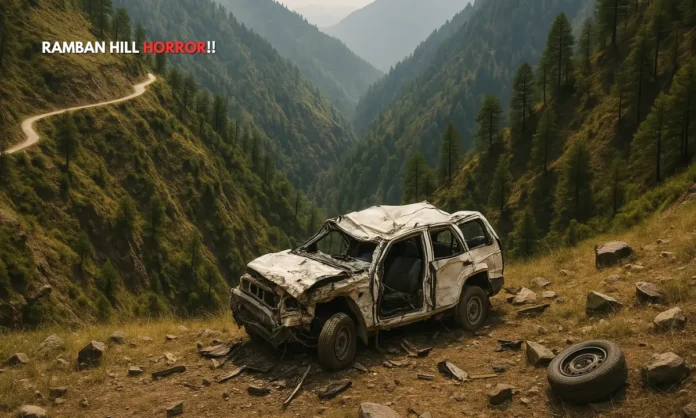Three-Point Summary:
- A Tata Sumo vehicle plunged 600 feet into a gorge in Ukhral, Ramban, killing five people, including the driver.
- The accident occurred on July 11 near Madina Masjid Hill; one more victim succumbed early Saturday at SKIMS Hospital, Srinagar.
- Survivors remain in critical condition at GMC Anantnag as authorities probe road safety lapses in the Paristan region.
A Routine Ride Turns Fatal in Jammu and Kashmir’s Mountainous Terrain
Friday’s fatal accident in Jammu and Kashmir’s Ramban district has reignited concerns over rural road safety in the Union Territory’s hill regions. What began as an ordinary journey along the Senabati link road ended in a devastating tragedy for six families, after a Tata Sumo vehicle lost control and plunged nearly 600 feet into a gorge near Ukhral’s Paristan area. By Saturday morning, the toll had climbed to five after another injured passenger succumbed at SKIMS Hospital in Srinagar.
This latest road disaster underscores a recurring crisis—crumbling infrastructure and unprotected cliff-side roads in remote districts. The vehicle involved, a locally owned Sumo, was navigating a notoriously dangerous stretch when it rolled down the hillside, despite clear weather conditions. Authorities have now identified the deceased, including the driver and owner, Mohammad Rafiq Gujjar, along with passengers Towqeer Ahmed Bhat and Abdul Latief Gujjar.
As rescue and medical teams scramble to treat the survivors, public outrage is simmering over the lack of basic safety infrastructure in Ramban. The accident has not only claimed lives but also left a trail of unanswered questions about administrative negligence and the safety of everyday transport in hilly terrains.
Tragic accident in #Ramban: 5 dead, 1 injured as a Tata Sumo plunges into a gorge near Madina Masjid, Senabathi. Injured shifted to GMC #Anantnag. Police register case, probe underway.@airnewsalerts @RambanPolice @dcramban @Traffic_hqrs pic.twitter.com/KHtvWATkWi
— Akashvani News Jammu (@radionews_jammu) July 12, 2025
Victims and Survivors: The Human Toll Behind the Numbers
- The driver, Mohammad Rafiq Gujjar, died on the spot.
- Three others succumbed at PHC Ukhral, SDH Banihal, and en route to GMC Anantnag.
- Two injured survivors are in critical condition at GMC Anantnag.
While details are still emerging, police have confirmed that six individuals were inside the vehicle when it veered off the road near Madina Masjid Hill. Locals rushed to assist before formal rescue teams arrived, helping transport the injured to PHC Ukhral.
Medical officials stated that two passengers were declared dead upon arrival at PHC Ukhral. Another died shortly after being transferred to SDH Banihal. A fourth victim succumbed while being moved to GMC Anantnag, and the fifth passed away the next morning at SKIMS Hospital.
The two remaining survivors, both severely injured, are receiving advanced treatment at GMC Anantnag. Doctors have indicated that their conditions are serious, but stable.
Unsafe Roads and Unanswered Accountability
- The accident site lacked guardrails or warning signage.
- Paristan and Ukhral regions are known for treacherous roads and frequent accidents.
- Government infrastructure efforts have largely bypassed these remote communities.
Local residents and opposition leaders alike are raising concerns about the chronic neglect of interior roads in Pogal Paristan tehsil. The road where the accident took place—Senabati link road—is a lifeline for several isolated panchayats, yet remains poorly maintained with no barriers to prevent vehicles from slipping over cliffs.
Experts point out that nearly 70% of Ramban district roads are unpaved or under temporary repair, despite multiple budgetary allocations. The absence of a robust mountain road safety policy has created a situation where accidents like this are not just possible—but inevitable.
Calls are growing for an independent road safety audit, stricter regulation of transport permits, and installation of crash barriers in high-risk areas. The local administration has yet to announce any compensation for the victims’ families or initiate an inquiry into potential administrative lapses.
A Valley in Mourning: What This Says About Rural Transport Equity
- Rural regions continue to face infrastructure discrimination compared to urban hubs.
- Tragedies like Ramban’s are often dismissed as “accidents” rather than preventable events.
- A systemic overhaul is required to prevent further loss of life.
This incident in Ramban is more than a road mishap—it is a mirror to the broader issue of infrastructure inequality in Jammu and Kashmir. When residents in Paristan or Bingara must travel daily on deathtrap roads without the assurance of basic safety, the cost is not just economic—it is human.
The bereaved families have not only lost loved ones but also primary breadwinners. With monsoons approaching, such roads will become even more dangerous unless immediate steps are taken. Community groups are demanding that Ramban’s remote roadways be included in the UT’s “Critical Infrastructure Upgrade Plan.”
Until such structural and policy shifts occur, tragedies like this will continue to define rural transportation in India’s hilly districts.
Mountain Roads, Missed Warnings: A Preventable Toll in Ramban
The Ramban road accident of July 2025, which claimed five lives, is a grim reminder of India’s ongoing failure to address the dangers of rural mountain travel. Despite countless past tragedies, the Senabati link road—like many others in Jammu and Kashmir’s hilly interiors—remained unfenced, unmarked, and perilously narrow. What’s most damning is that this wasn’t a case of unpredictable weather or mechanical failure. It was, in essence, a collapse of policy, planning, and political will.
Innocent lives were lost not due to fate, but due to systemic neglect. The people of Ukhral and Paristan, who have long voiced their concerns, deserve more than condolences. They deserve durable infrastructure, urgent road audits, and a seat at the table when development plans are made. If India is serious about inclusive growth, it must stop treating rural road safety as an afterthought.
Until then, tragedies like Ramban won’t be the exception—they will remain the rule.


